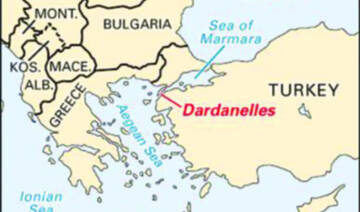BEIRUT: The Lebanese army on Friday received a new batch of heavy weapons from Palestinian Liberation Organization factions in refugee camps in Lebanon.
These included the Shatila camp and Mar Elias camp in Beirut, as well as the Burj Al-Barajneh camp in Beirut’s southern suburb, in line with a Lebanese-Palestinian disarmament deal as part of the Cabinet’s decision to restrict weapons to the state.
While Lebanese army vehicles did not enter the Burj Al-Barajneh camp, the handover took place in the courtyard where the first batch was delivered last week.
Twenty-four hours earlier, the Lebanese army had received a batch of light and medium weapons, B7 rockets, and medium-range surface-to-surface missiles from the camps of Tyre, Rashidieh, Burj Al-Shemali and Al-Bass, all located south of the Litani River. The confiscated weapons were transported in eight trucks: six from Rashidieh, one from Al-Bass and another from Burj Al-Shemali.
The weapons handover did not include Hamas and Islamic Jihad weapons, as these two organizations are not subject to the authority of the PLO.
It included six of the 12 camps, the largest of which is Ain Al-Hilweh, the most densely populated, with the largest number of armed Palestinian factions.
The Cairo Agreement with the PLO at the end of the 1960s legalized the weapons of factions affiliated with the PLO in Lebanon. The agreement fell apart after the civil war in Lebanon, when President Amin Gemayel signed a law revoking it in 1987. The law abolishing the agreement was approved by the Lebanese Parliament.
The weapons of Palestinian organizations that were formed later, including those of Hamas and Islamic Jihad, were deemed illegal.
Ramez Dimashkieh, head of the Lebanese-Palestinian Dialogue Committee, told Arab News that negotiations over the weapons of Hamas, Islamic Jihad and other affiliated Palestinian forces are underway.
“We are talking about the weapons of the PLO factions, with whom we negotiated and reached an agreement. As for the weapons of Hamas, Islamic Jihad, and Palestinian forces orbiting around them, the matter requires negotiations with them,” said Dimashkieh.
He added: “A dialogue took place some time ago and it was positive, but after Hezbollah’s position declaring that it would not hand over its weapons, we do not know Hamas’ stance or that of the allied forces, and we must negotiate.”
The handover of weapons in Beirut has been completed, and the next stage will take place in the camps of northern Lebanon and the Bekaa, and later, north of the Litani River, said Dimashkieh.
In a statement in WAFA, Nabil Abu Rudeineh, the official spokesman for the Palestinian presidency, confirmed that the “relevant Palestinian authorities in Lebanon have handed over the third batch of weapons belonging to the PLO that were present in the Palestinian camps in Beirut, to be placed in the custody of the Lebanese army.”
Abu Rudeineh affirmed that this step was taken in line with the agreement between Palestinian President Mahmoud Abbas and Aoun on May 21 to establish a joint Lebanese-Palestinian committee to monitor the situation in the Palestinian refugee camps in Lebanon and to work toward improving the lives of refugees, while respecting Lebanese sovereignty and complying with Lebanese laws.
He noted that “both parties reaffirmed their commitment to safeguarding the humanitarian, social, and economic rights of Palestinian refugees in Lebanon, in a manner that ensures them a dignified life without compromising their right of return or undermining their national identity.”
They also reiterated their commitment to keeping all weapons exclusively under the Lebanese state’s authority throughout its territory.
The Lebanese–Palestinian Dialogue Committee said this process reflects “a transition to a new phase of Lebanese–Palestinian relations, based on partnership and cooperation in safeguarding national stability and respecting Lebanese sovereignty.”
Meanwhile, an Israeli drone carried out a strike with a guided missile on a car at the entrance to the town of Sir El Gharbiyeh in the Nabatieh area, north of the Litani River, killing Hezbollah member Ahmed Naim Maatouk, who had previously been wounded in Israeli explosions targeting pagers supplied to Hezbollah members about a year ago.
On Friday, Lebanese army commander Gen. Rodolph Haykal took part in the funeral of 1st Lt. Mohammed Ismail and First Adjutant Rifaat Al-Taaimi at the Central Military Hospital. The two soldiers were killed on Thursday evening as a result of the explosion of an Israeli drone while inspecting it in the town of Naqoura.
The Israeli army claimed in a statement that the drone “was targeting a Hezbollah vehicle, and we regret the injury of Lebanese army soldiers.”
It said it launched an investigation into the incident in which ammunition failed to explode and fell in Naqoura.


























